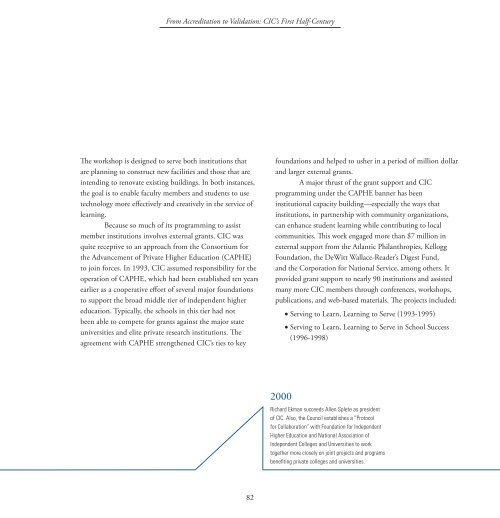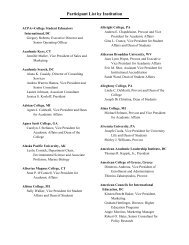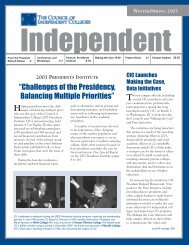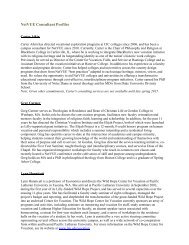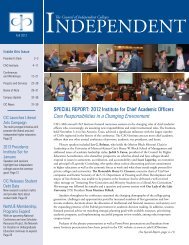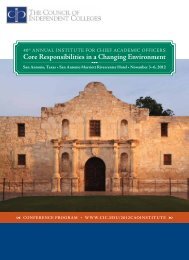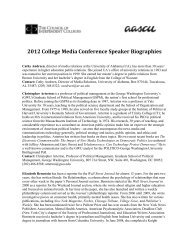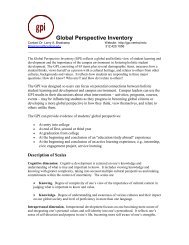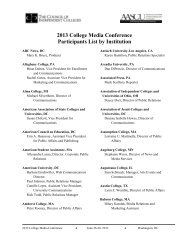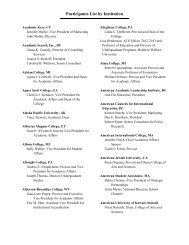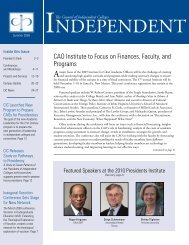Meeting the Challenge: - The Council of Independent Colleges
Meeting the Challenge: - The Council of Independent Colleges
Meeting the Challenge: - The Council of Independent Colleges
Create successful ePaper yourself
Turn your PDF publications into a flip-book with our unique Google optimized e-Paper software.
From Accreditation to Validation: CIC’s First Half-Century<br />
<strong>The</strong> workshop is designed to serve both institutions that<br />
are planning to construct new facilities and those that are<br />
intending to renovate existing buildings. In both instances,<br />
<strong>the</strong> goal is to enable faculty members and students to use<br />
technology more effectively and creatively in <strong>the</strong> service <strong>of</strong><br />
learning.<br />
Because so much <strong>of</strong> its programming to assist<br />
member institutions involves external grants, CIC was<br />
quite receptive to an approach from <strong>the</strong> Consortium for<br />
<strong>the</strong> Advancement <strong>of</strong> Private Higher Education (CAPHE)<br />
to join forces. In 1993, CIC assumed responsibility for <strong>the</strong><br />
operation <strong>of</strong> CAPHE, which had been established ten years<br />
earlier as a cooperative effort <strong>of</strong> several major foundations<br />
to support <strong>the</strong> broad middle tier <strong>of</strong> independent higher<br />
education. Typically, <strong>the</strong> schools in this tier had not<br />
been able to compete for grants against <strong>the</strong> major state<br />
universities and elite private research institutions. <strong>The</strong><br />
agreement with CAPHE streng<strong>the</strong>ned CIC’s ties to key<br />
foundations and helped to usher in a period <strong>of</strong> million dollar<br />
and larger external grants.<br />
A major thrust <strong>of</strong> <strong>the</strong> grant support and CIC<br />
programming under <strong>the</strong> CAPHE banner has been<br />
institutional capacity building—especially <strong>the</strong> ways that<br />
institutions, in partnership with community organizations,<br />
can enhance student learning while contributing to local<br />
communities. This work engaged more than $7 million in<br />
external support from <strong>the</strong> Atlantic Philanthropies, Kellogg<br />
Foundation, <strong>the</strong> DeWitt Wallace-Reader’s Digest Fund,<br />
and <strong>the</strong> Corporation for National Service, among o<strong>the</strong>rs. It<br />
provided grant support to nearly 90 institutions and assisted<br />
many more CIC members through conferences, workshops,<br />
publications, and web-based materials. <strong>The</strong> projects included:<br />
• Serving to Learn, Learning to Serve (1993-1995)<br />
• Serving to Learn, Learning to Serve in School Success<br />
(1996-1998)<br />
2000<br />
Richard Ekman succeeds Allen Splete as president<br />
<strong>of</strong> CIC. Also, <strong>the</strong> <strong>Council</strong> establishes a “Protocol<br />
for Collaboration” with Foundation for <strong>Independent</strong><br />
Higher Education and National Association <strong>of</strong><br />
<strong>Independent</strong> <strong>Colleges</strong> and Universities to work<br />
toge<strong>the</strong>r more closely on joint projects and programs<br />
benefiting private colleges and universities.<br />
82


